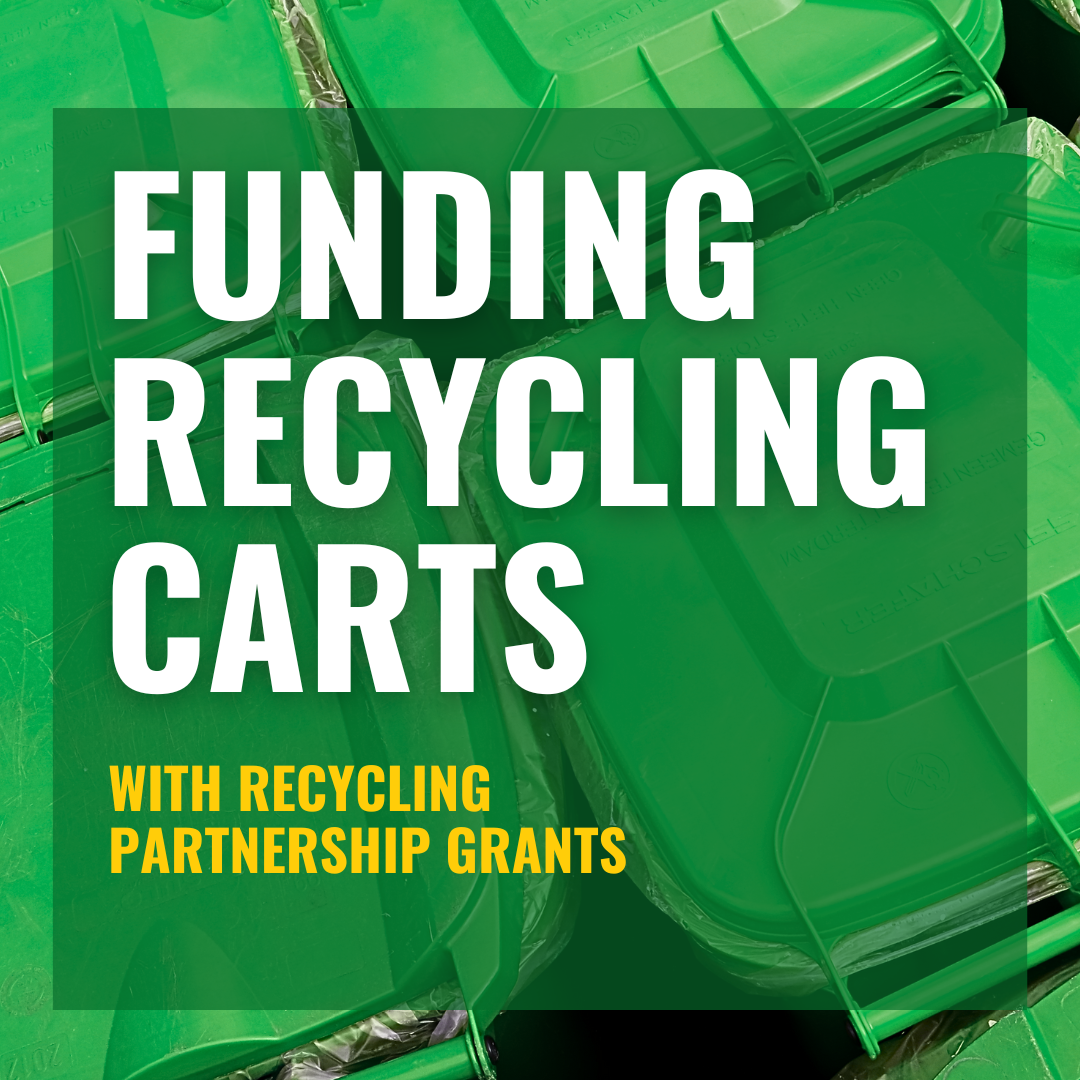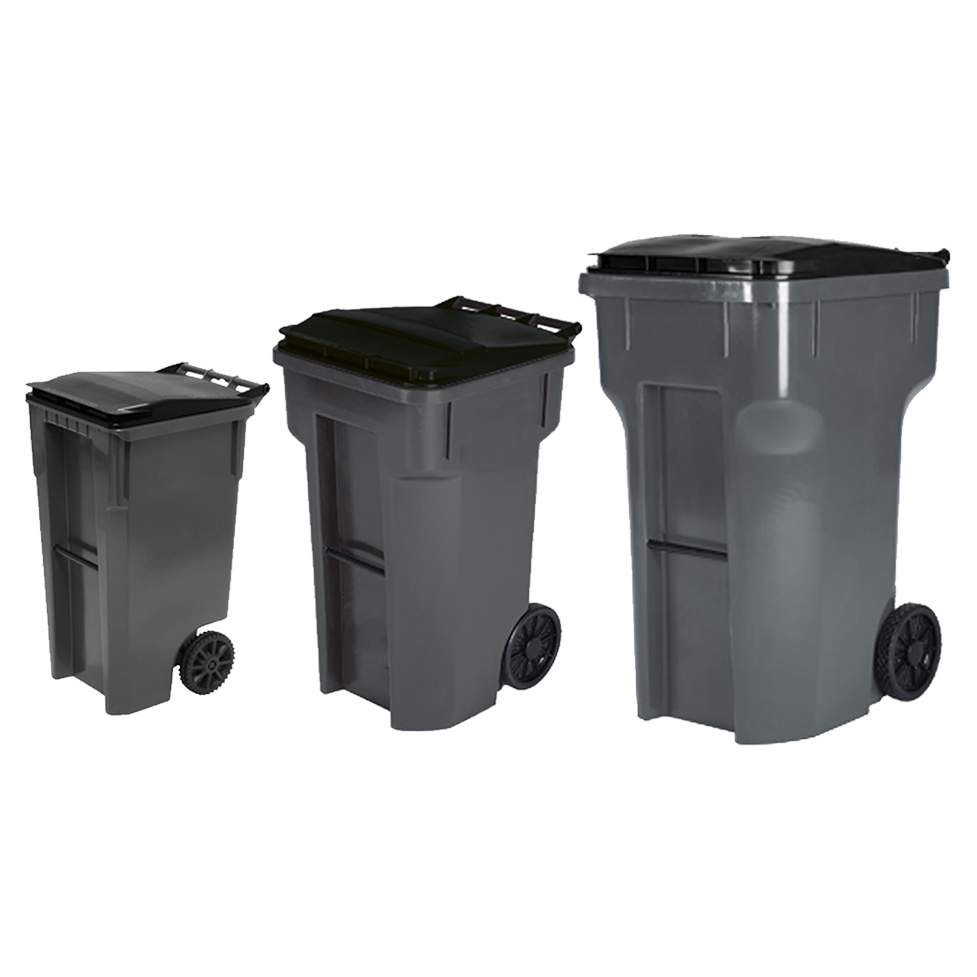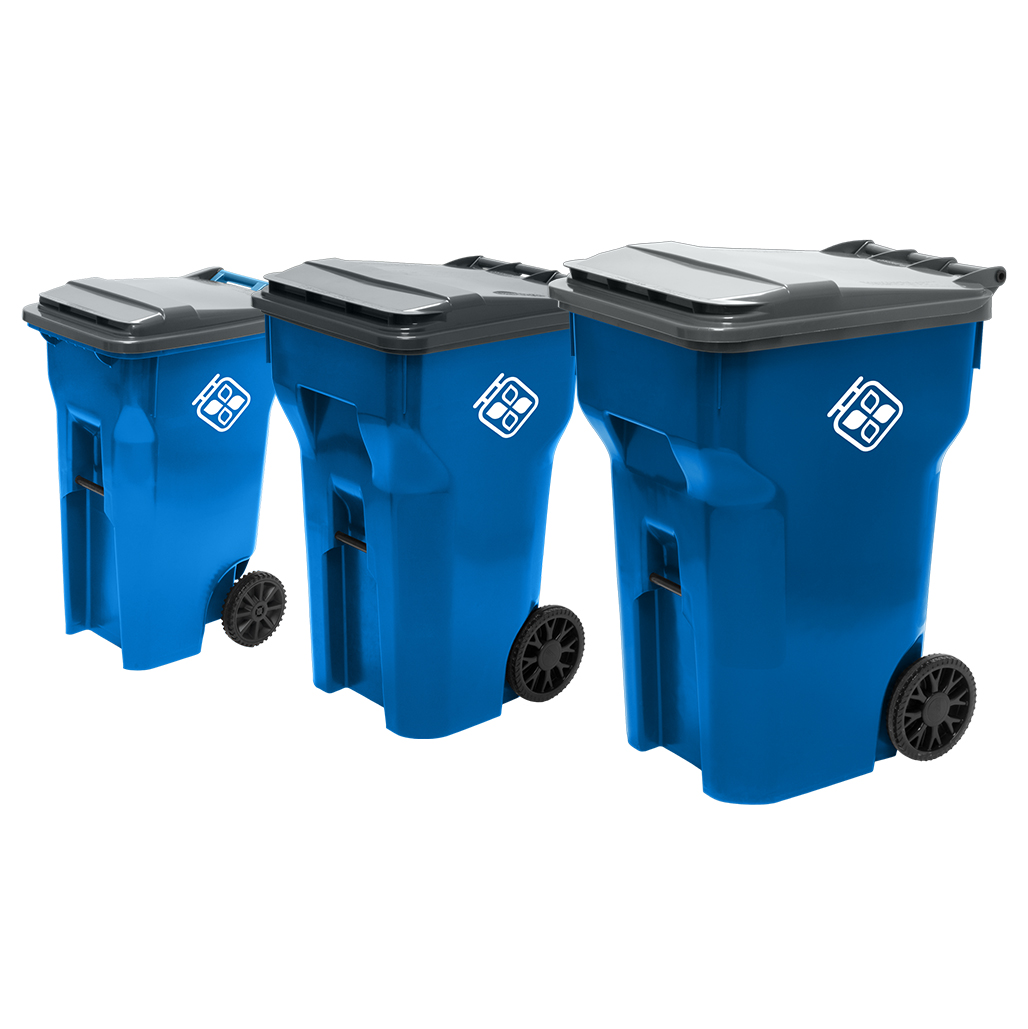We use cookies to make your experience better. To comply with the new e-Privacy directive, we need to ask for your consent to set the cookies. Learn more.
Funding Recycling Carts With Recycling Partnership Grants
Every municipal recycling program faces the same challenge: What’s the best way to collect materials?
Drop-off centers are good at keeping material streams uncontaminated, but they’re inconvenient for residents. Recycling dumpsters are convenient, but easy to contaminate. Cart-based collection seems to find the happy medium between low contamination and convenience. Convenience contributes directly to participation, and therefore better recovery rates, so it’s an important consideration.

There are more benefits to cart-based collection, too. According to the NGO Recycling Partnership, single-stream recycling carts can save municipalities money, improve safety for recycling workers, and, ultimately, improve recycling rates across the community.
But it’s not easy to make the switch from a bin- or dumpster-based system to collection via recycling cart. The institutions that pay for these programs — typically local governments or solid waste agencies — may struggle with costs. After all, it can be expensive to distribute Roll Out Carts across a large community.
The good news is that funding is available. Here’s a quick introduction to the flagship Recycling Partnership grant for recycling carts.
Recycling Partnership Grants for Recycling Carts
The Recycling Partnership offers a standing series of grants that apply to stakeholders across the waste stream. They offer funding to materials recovery facilities (MRFs) and material processors, covering the cost of MRF equipment that improves capacity, throughput, and/or sortation.
They also provide grants for community recycling programs. These are the funding opportunities that may cover recycling carts. Of the five grants currently listed on the Recycling Partnership’s list of funding opportunities, only one is designed specifically to help communities launch cart-based curbside recycling programs. We’ll focus on that program in this article.
Here are the details on the Recycling Partnership’s Residential Curbside Recycling Cart Grant.
The Residential Curbside Recycling Cart Grant
This is the ideal funding opportunity for cart-based recycling programs. You can use it to start a curbside recycling system from scratch; to shift from bins or bags to recycling carts; or to grow existing recycling programs.
In addition to funding the purchase of recycling carts, this grant covers some marketing costs for your recycling program. In fact, recipients of this grant must work with the Recycling Partnership on an outreach campaign for residents.
That makes sense; after all, you can’t get people to participate in a new recycling program without explaining it to them first. Luckily, the Recycling Partnership has lots of experience — and ready-to-go educational materials — to make your outreach campaign a success.
Who’s Eligible to Apply for Residential Curbside Recycling Cart Grants
Only three types of institutions can receive this grant: local governments, solid waste authorities, or federally recognized tribes. You also have to be in the United States (including territories). The good news is that there’s no lower size limit; communities of any number are eligible for this grant.
Here are a few more stipulations on eligibility for this grant program:
- The Residential Curbside Recycling Cart Grant is not available to private businesses, schools, or institutions other than the three listed above.
- The grant also only covers new carts; you can’t use it to replace carts in an existing curbside recycling program.
- Finally, these funds are for recycling only. You can’t use it to fund other waste-handling strategies, including sustainable ones like composting.
If you represent a local government, tribal authority, or solid waste agency, however, this grant is an excellent funding source for cart-based recycling. But how much is it worth? That depends on how, exactly, you plan to implement your curbside recycling program.
The 5 Strategies for Implementing Cart-Based Recycling Programs
The Residential Curbside Recycling Cart Grant ties funding limits to your specific launch strategy. The Recycling Partnership recognizes five such strategies:
- Immediate universal distribution. Give recycling carts to every residential household in your coverage area, all at once.
- Phased universal distribution. Give recycling carts to every residential household in your coverage area, one region at a time, in a phased approach.
- Distribution to willing participants (opt-out). Give recycling carts to every residential household in your coverage area, except for those residents who choose not to participate.
- Zoned distribution. Give recycling carts to residential households in certain areas, without planning to expand the program to your whole coverage area.
- Distribution to willing participants (opt-in). Give recycling carts only to residential households that opt into the program.
Each of these strategies is tied to a different level of grant funding, with the most available for Strategy 1 and the least for Strategy 5.
Residential Curbside Recycling Cart Grant Funding Limits
This grant provides between $5 and $15 per recycling cart, depending on your program strategy. Funding caps as we publish are as follows:
- Strategy 1: $15 per cart, up to $750,000; up to $75,000 for outreach; total cap of $825,000
- Strategy 2: $12 per cart, up to $600,000; up to $50,000 for outreach; total cap of $650,000
- Strategy 3: $10 per cart, up to $500,000; up to $50,000 for outreach; total cap of $550,000
- Strategy 4: $8 per cart, up to $400,000; up to $50,000 for outreach; total cap of $450,000
- Strategy 5: $5 per cart, up to $250,000; up to $50,000 for outreach; total cap of $300,000
These funds are available as reimbursements. The Recycling partnership says it will pay them out within 30 days of receiving invoices and documentation for eligible expenses.
Applying for the Residential Curbside Recycling Cart Grant
To apply for the Residential Curbside Recycling Cart Grant, prepare an application in accordance with the grant’s official request for proposals (RFP).
This is an ongoing grant, which means there are no particular deadlines. The Recycling Partnership accepts RFPs any time.
Once you send in your application, the Recycling Partnership will review it and respond within about 90 days.
Even if you get the grant, however, you can’t use it to buy just any recycling carts. The Recycling Partnership has strict requirements for these products, including minimum volumes, integrated RFID chips (whether you use them or not), and labeling. Next, we’ll explain what sorts of recycling carts are eligible for reimbursement under the Recycling Partnership’s grant program.
Recycling Cart Eligibility for Recycling Partnership Grants
To be eligible for grant funding, the carts you buy have to meet certain characteristics. Here are the requirements for grant-funded recycling carts:
- For weekly collection programs, carts must be over 60 gallons in volume.
- For biweekly collection programs, carts must be over 90 gallons in volume.
- Smaller carts may be approved as accommodations for accessibility, but only in the context of pre-established criteria.
- Carts contain at least 5 percent post-consumer recycled plastic.
- Carts must include embedded radio frequency identification (RFID) tags.
- Carts must be labeled to indicate collection of recyclable materials only.
- Carts must be visually distinct from standard waste collection carts.
- You must make carts available to residents at no additional cost (outside of service taxes or fees).
There’s just one question left: Where can you find carts that meet these requirements? Look no further than Solus Group.
Cascade Recycling Carts from Solus Group
Solus Group is your one-stop material handling depot, and we specialize in bins and bin-handling equipment. Two particular products stand out as great candidates for municipal recycling carts:
- Cascade ICON Series Roll-Out Carts. The 64- and 94-gallon models of Cascade Icon Roll-Out Carts comply with the Residential Curbside Recycling Cart Grant’s volume requirements. Every ICON Series recycling cart also includes an embedded RFID card, meeting another grant requirement. Custom graphics, including hot stamps and full-color lid graphics, are available to meet the Recycling Partnership’s labeling requirement.
- Cascade Sterling Series Roll-Out Carts. The Cascade Sterling Series offers the same options and eligibility requirements of the ICON Series, but with a design feature that optimizes automated recovery. These recycling carts include a double-wall lower lift pocket with an integrated lift bar, making it the perfect option for automated truck collection.
In short, either option is ideal for building your new cart-based recycling program. But what about the Recycling Partnership’s requirement about using recycled materials in eligible carts?
While all Cascade plastic bins contain recycled content, the manufacturer doesn’t specify a percentage for standard models. Instead, they offer the Ecocart option, which is available for all ICON and Sterling carts.
The Ecocart version of these products contains 10 percent post-consumer recycled plastic, doubling the minimum requirement for eligibility under the Residential Curbside Recycling Cart Grant.
Learn more about Cascade’s Ecocart models of ICON and Sterling Series Roll-Out Carts by calling Solus Group at 314-696-0200. We’ll work with you to ensure you get the perfect recycling carts, including eligibility for Recycling Partnership grants.


